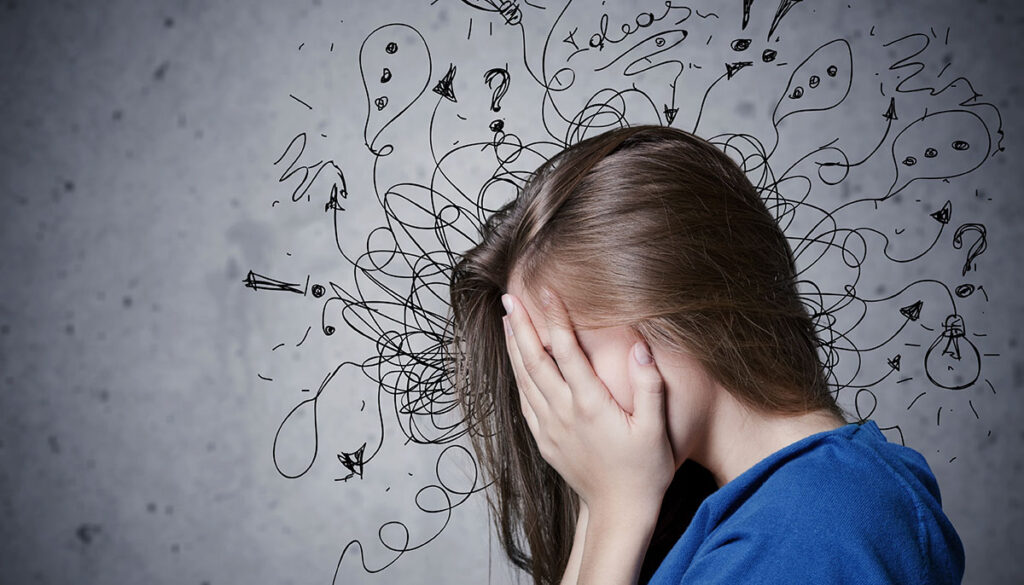If I asked you to picture a person with ADHD, who would you see? For most people, attention-deficit/hyperactivity disorder looks like a young, rambunctious boy who can’t sit still or pay attention in class. Basically, Calvin from Calvin & Hobbes. That image—a stereotype, if I’m being honest—has done a lot of harm over the years.
Why? Because ADHD presents differently in girls and women. While boys and men tend to be on the more hyperactive end of the spectrum, girls and women are more likely to have the inattentive type of ADHD. If this neurological disorder was better understood, I might not have had to wait until my mid-30s to finally get a diagnosis.
Signs of ADHD in Women
First, let me say that I’m not a medical professional. I’m speaking from my personal experience as well as the research I’ve done on ADHD, and I’ll cite my sources. However, if you feel like you might be a neurodivergent adult, then it’s important that you talk with your doctor.

When girls and women have ADHD, the symptoms are “less obvious or socially disruptive” than their male counterparts, according to Keath Low writing for VeryWellMind. Whereas a ten-year-old boy with ADHD might be bouncing off the walls during class, a ten-year-old girl might be absently doodling in her notebook or staring out the window. Both of them are struggling with paying attention, but only one is causing chaos in the classroom.
Guess which one gets a diagnosis sooner?
In girls and women, ADHD is often overlooked. This is especially true when they manage to pull off decent grades despite chronic procrastination. These folks are often labeled “space cadets,” “chatterboxes,” or even plain old lazy. Eventually, many of them will internalize their struggles as character flaws.
Do any of these symptoms of ADHD in women sound familiar to you?
- Has a disorganized and cluttered home
- Difficulty focusing and listening
- Easily bored and distracted
- Jumps from hobby to hobby
- Unable to make decisions
- Struggles to complete projects
- Forgetful and absentminded
- Frequently misses deadlines
- Becomes attached to people very quickly
- Takes rejection harder than most people
- Experiences mood swings
- Tends to overspend or make impulsive purchases
- Often talks over people or goes from A to C without stopping at B
- Procrastinates until the situation becomes a crisis
If you recognize yourself in more than half of those symptoms, then you might want to have a chat with your primary care physician or therapist about whether you might have ADHD. Non-neurotypical women are chronically underdiagnosed, and it’s worth having a conversation with your doctor.
Women with ADHD are often diagnosed as having depression and/or anxiety, and it’s certainly possible to have both. However, treatment is very different.
What Is ADHD?
As with many brain disorders, scientists aren’t totally sure what causes ADHD. There’s a genetic component, as you are more likely to have ADHD if a family member was also diagnosed. Although more research is needed, it appears that dopamine plays a major role.
What is dopamine? I’ll let Neel Duggal of Healthline explain:
Dopamine allows us to regulate emotional responses and take action to achieve specific rewards. It’s responsible for feelings of pleasure and reward.
The brains of people with this neurological disorder have fewer dopamine transporters, a protein that transports this important neurotransmitter. Since your brain can’t access dopamine like a neurotypical person, it may compel you to seek out more and more of it. The lowest-hanging dopamine fruits are usually negative behaviors like compulsive gambling or shopping, eating sugary or salty foods, or mindlessly scrolling on social media.

Additional research suggests that two other neurotransmitters–norepinephrine and serotonin—may also play a role in the ADHD brain. Norepinephrine is related to attention and “can affect areas of the brain that help you solve problems, plan ahead, understand others’ actions, and control impulses,” according to the American Academy of Child and Adolescent Psychology, via Everyday Health.
Serotonin is probably familiar to anyone who has struggled with depression. If you want to get really crunchy with it, you can read this paper about the relationship between serotonin receptors and ADHD. The short version is that it seems like dopamine, serotonin, and norepinephrine all work together to help regulate the brain’s responses to stimulation. When a brain doesn’t have enough receptors to make use of these neurotransmitters, it can result in ADHD symptoms.

Unfortunately, the symptoms in women can look a lot like other mental health disorders, resulting in misdiagnosis. In fact, it’s often not until women have children of their own who get diagnosed with ADHD that they realize it might be an issue for them, too. As they educate themselves about their child’s condition, they recognize their own symptoms.
The American Psychological Association published a fantastic article about the inherent bias against diagnosing girls with ADHD almost 10 years ago, and sadly, not that much has changed in the medical community since then. However, a growing number of YouTubers and TikTokers are sharing content about their experiences, spreading awareness of what it’s like to have ADHD, and advocating for their non-neurotypical peers.
That’s how I first learned about what this neurological disorder looks like in women. I stumbled on an article while searching for an explanation of why my brain was so broken, which led me to the YouTube channel How to ADHD, and the rest is history. Well, actually, it’s my story.
My ADHD Story
Warning: This section gets a little heavy. If you struggle with disordered eating, depression, or anxiety, then you might find the following story triggering.
When I was a teenager, I was diagnosed with depression. Later, I would also be diagnosed with anxiety. While those diagnoses seemed to explain what was going on in my head, I still couldn’t find any combination of medication and therapy that helped me. The more I struggled and felt frustrated, the more it seemed like I was just doomed to be broken forever.

All my life, I’ve been a gifted underachiever. I did well in school when the subject interested me—really well if I was fully engaged, as I was in English class—but if I was bored or frustrated, then forget about it. I was a chronic procrastinator and rarely followed through on my ideas and plans. My room was a mess, too. I also had trouble maintaining stable friendships because I was clingy and overly sensitive.
While almost everyone has struggled from time to time with disorganization and inattention, I was barely holding it together throughout high school and into college. By the time I went to grad school, I was barely paying attention to my classes and turning in papers weeks late. No matter how good my intentions were, no matter how determined I was that this time things would be different, I still felt like a failure.
And it turns out that feeling like a failure for most of your life is actually really bad for your mental health and self-esteem. Depression and ADHD tend to go hand in hand. According to the advocacy group CHADD, about 1 in 3 people who are diagnosed with ADHD will also experience depression. Moreover, the same article reveals that it’s often a “chicken vs. egg” situation between the two disorders.
For some people, depression and ADHD just happen to coexist, but for others, depression is a result of ADHD, with low self-esteem and a poor self-image caused by ongoing feelings of being overwhelmed by life due to ADHD symptoms.
Once I was finally diagnosed with ADHD, my first reaction was relief. Knowing that there was a reason why I felt like such a dumpster fire lifted a burden from my shoulders. But what I didn’t expect was the anger that followed. I’ve since learned that it’s common to go through a “grief cycle” that includes anger when diagnosed later in life. I felt furious that no one had realized what was going on with me sooner. I was angry at having lost so many years without the treatment I needed to function.

Then came the worst part. I started taking medication, and it sort of helped. But it wasn’t the near-magical, light-switch-flipping experience that I wanted. Maybe it was a little easier to focus, but I was still struggling with the same self-destructive dopamine-seeking behaviors, and I wasn’t any closer to finishing that novel. Or cleaning my kitchen. It felt like I was doomed all over again.
Many people choose to manage their ADHD without medication. For me, it took trying several different types of medication before something finally clicked. Suddenly, washing the dirty dishes piled in my sink didn’t feel like one of the labors of Hercules. It was just a task that needed to be done—and it only took like, ten minutes.
I still need to use organizational tools and other coping strategies to keep my brain on task. I’m also still learning to be gentle with myself when I get overwhelmed or frustrated. My brain is wired differently from the majority of people, and that’s okay. Having ADHD allows me to focus with laser-like intensity when I’m interested in something. I’ve never been able to think inside the box, but I can appreciate my… unique thought process for the gift that it is.
If you’ve read this far and recognize yourself in my story, then I hope that you’ll keep pushing for the help that you need. Don’t give up on yourself. You’re not a failure—and you’re not alone.













